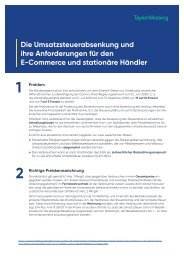Taylor Wessing - Key legal issues for games businesses
Create successful ePaper yourself
Turn your PDF publications into a flip-book with our unique Google optimized e-Paper software.
<strong>Key</strong> <strong>legal</strong> <strong>issues</strong> <strong>for</strong> <strong>games</strong> <strong>businesses</strong> in Europe<br />
Terms of Use/Terms of Service<br />
u Issues<br />
Each of the 28 European Union Member States has different mandatory<br />
<strong>legal</strong> requirements protecting players, which generally apply to the terms<br />
<strong>games</strong> <strong>businesses</strong> enter into with them (often referred to as terms of use<br />
(ToU) or terms of service (ToS) and often entered into jointly with an end<br />
user license agreement (EULA)).<br />
The most common areas that are subject to the varying laws are limitations<br />
of liability, requirements <strong>for</strong> local language, indemnities, one-sided<br />
provisions generally, and restrictive choices of governing law and jurisdiction.<br />
If these <strong>legal</strong> requirements are not met then those terms could be<br />
rendered unen<strong>for</strong>ceable, (leading in some cases to unlimited liability or at<br />
least uncertainty of terms.) also, local consumer-protection bodies can<br />
apply sanctions causing cost and potentially fines.<br />
In many cases competitors can trigger this through submissions to regulators.<br />
Furthermore, in Europe, small print is increasingly seen as a brand<br />
issue, with many <strong>games</strong> <strong>businesses</strong> using “plain speaking”, “FAQ” style<br />
approaches which support their brand and ethos. The example of Instagram<br />
shows how poorly conceived small print can drive to brand damage<br />
and, ultimately, shareholder loss.<br />
u Market Practice<br />
Localising terms <strong>for</strong> all 28 European Union Member States is, of course,<br />
time consuming and raises practical <strong>issues</strong>. Our experience is<br />
that many <strong>games</strong> <strong>businesses</strong> focus on the top X markets in Europe<br />
(X may commonly be 5, or more, but rarely 20+), and develop terms that<br />
comply with the local laws in those markets.<br />
Development and publishing<br />
Contracts <strong>for</strong> <strong>games</strong> development and <strong>games</strong> publishing need to balance<br />
interests between the parties involved. The particular circumstances <strong>for</strong><br />
the several plat<strong>for</strong>ms such as PCs, consoles and mobile devices have to<br />
be kept in mind.<br />
Data Protection and marketing<br />
u Issues<br />
On 25 th of May 2018 the General Data Protection Regulation (GDPR)<br />
came into effect. This Regulation harmonises data protection across<br />
Europe although several aspects remain in the national legislation via<br />
flexibility clauses (e.g. processing in employment context). GDPR builds<br />
on some existing principles, it also contains extended and new obligations<br />
regarding data processing as well as extended rights <strong>for</strong> data subjects.<br />
Most importantly, fines have drastically increased.<br />
In addition, special national regulations must be observed due to the flexibility<br />
clauses contained in the GDPR (e.g. with regard to data processing<br />
in the employment context). Furthermore, the GDPR also applies to non-<br />
EU companies that operate in the EU and process data from EU citizens.<br />
Guidance regarding the implementation of the GDPR is provided by national<br />
supervisory authorities as well as the European Data Protection Board.<br />
The following principles are the basic principles of the GDPR:<br />
> Lawfulness, fairness and transparency<br />
> Purpose limitation<br />
> Data minimisation<br />
> Accuracy<br />
> Storage limitation<br />
> Integrity and confidentiality<br />
> Accountability<br />
The transfer of personal data of players to third parties outside the European<br />
Union requires additional legitimation, such as reliance on EU model<br />
clauses or – with regards to the US – reliance on the “EU-US Privacy<br />
Shield”. As the value of player data, and the knowledge and awareness of<br />
European consumers about their rights, increases, these <strong>issues</strong> are crucial<br />
<strong>for</strong> <strong>games</strong> <strong>businesses</strong>.<br />
The GDPR also imposes a number of requirements around the use of<br />
cookies, tracking and similar technologies. In particular, it is important to<br />
distinguish between technologies that require consent and other that<br />
do not require consent. The upcoming e-Privacy Directive will introduce<br />
additional rules <strong>for</strong> cookies. Providers of <strong>games</strong> sites/plat<strong>for</strong>ms should<br />
carry cookie policies which specify details as to cookies used along with<br />
in<strong>for</strong>mation about how to deactivate them. The same <strong>legal</strong> assessment<br />
has to be carried out regarding the sending of marketing/promotional<br />
newsletters.<br />
u E-Privacy Regulation<br />
The EU is also currently working on the revision of the ePrivacy Directive,<br />
which is intended to strengthen citizens‘ rights online and regulate data<br />
protection in the online sector. The Regulation will affect almost every<br />
<strong>for</strong>m of electronic communications, including both traditional communications<br />
services and novel technologies.<br />
The use of cookies is expected to be regulated more stringent, including<br />
the question which cookies require consent. The ePrivacy Regulation will<br />
exist in addition to GDPR and is expected to enter into <strong>for</strong>ce at the beginning<br />
of 2019 at the earliest, followed by a transitional period.
E-Commerce – be<strong>for</strong>e the purchase<br />
The European market is subject to “distance selling” laws that protect<br />
players in relation to purchases online. Prior and after any purchase of<br />
<strong>games</strong>, or in-game items or virtual currency, online-game <strong>businesses</strong> have<br />
to comply with numerous requirements, which include:<br />
> The communication of clear terms and conditions at the time and<br />
also by e-mail (or at least a “durable medium”) upon order;<br />
> Fulfilment requirements in terms of payment; and<br />
> A right of refund <strong>for</strong> some products and services (which may apply<br />
to gaming items depending on the circumstances).<br />
Un<strong>for</strong>tunately, these requirements vary to a degree across the Member<br />
States. Further, each European Union Member State was required to give<br />
effect to the Directive on Consumer Rights (Directive 2011/83/EU) by<br />
13 June 2014. Each country is doing so under its own legislation. This<br />
new Directive requires, inter alia, online <strong>games</strong> <strong>businesses</strong> to ensure the<br />
player, when placing an order, explicitly confirms that the order implies an<br />
obligation to pay. If placing an order entails activating a button or a similar<br />
function, the button or similar function must be labelled in an easily legible<br />
manner only with the words ‘order with an obligation to pay’ or a corresponding<br />
unambiguous <strong>for</strong>mulation in the local language.<br />
There are also new regulations regarding digital content which will have an<br />
impact on <strong>games</strong> <strong>businesses</strong>, such as the requirement to obtain express<br />
consent and acknowledgment from players that the 14 day cooling off<br />
period will not apply after download.<br />
The current draft <strong>for</strong> a European Directive on Digital Content is likely to introduce<br />
the concept of “payment by data”, establish significant statutory<br />
warranties and retrieval of user content and user data upon termination.<br />
As the scope of this directive is broad, it will affect all online and mobile<br />
<strong>games</strong> providers selling to European customers. It is currently expected<br />
that the EU will adopt the Directive by the end of 2018.<br />
If <strong>games</strong> <strong>businesses</strong> fail to comply with the legislation which implements<br />
the Directive on Consumer Rights, it is likely that their players will not be<br />
<strong>legal</strong>ly bound under the relevant end user terms which include, of course,<br />
the obligation to pay (e.g. the cost of the game, virtual items and/or currency).<br />
It is there<strong>for</strong>e important that <strong>games</strong> <strong>businesses</strong> ensure the in<strong>for</strong>mation<br />
disclosure and other requirements of the implementing legislation<br />
are complied with.<br />
Online liability<br />
To the extent <strong>games</strong> <strong>businesses</strong> allow players to communicate with each<br />
other/post content or comments on the plat<strong>for</strong>m, such <strong>businesses</strong> run<br />
the risk of content liability. European laws do include certain defences<br />
around “hosters” and “ISPs” however the applicability of these is dependent<br />
on careful consideration in terms of operating model, particularly<br />
around moderation and notice and take-down procedures <strong>for</strong> so called<br />
host providers. According to recent case law of the European Court of<br />
Justice, internet access providers may be obliged to block content which<br />
infringes copyright under certain circumstances.<br />
Hosting of tournaments<br />
Games tournaments can be subject to various <strong>legal</strong> requirements. When<br />
hosting “offline” tournaments often held at events such as Gamescom or<br />
GDC, the host might also have to comply with additional requirements<br />
such as in respect of youth protection (e.g. not permitting underage gaming<br />
or supplying minors with alcohol), gambling law, advertisement law<br />
and entry requirements <strong>for</strong> players.<br />
When streaming a tournament, that streaming may under certain conditions<br />
qualify as a broadcast and be subject to a licensing requirement.<br />
The same may apply <strong>for</strong> gamers streaming gaming content on plat<strong>for</strong>ms<br />
like Twitch.<br />
Used <strong>games</strong> and key selling<br />
Recent case law in Europe has confirmed the rights of software licensees<br />
to share software which is “sold” and software providers, depending on<br />
their licensing model, cannot prevent this. The application of these laws to<br />
<strong>games</strong> software is uncertain but possible. Technical measures can be used<br />
and cloud based <strong>games</strong> are likely to not be caught. Of course the second<br />
hand market in disc based <strong>games</strong> is long established, however the laws<br />
present challenges <strong>for</strong> providers of downloaded <strong>games</strong> and terms need to<br />
be carefully crafted.<br />
Similar questions arise in connection with so-called key selling. German<br />
district courts ruled that the sale of isolated product keys by a third party<br />
infringed copyright and could be stopped accordingly.<br />
General additional <strong>issues</strong><br />
Recent case law in Europe has confirmed the rights of software licensees<br />
to share software which is “sold” and software providers, depending on<br />
their licensing model, cannot prevent this. The application of these laws to<br />
<strong>games</strong> software is uncertain but possible. Technical measures can be used<br />
and cloud based <strong>games</strong> are likely to not be caught. Of course the second<br />
hand market in disc based <strong>games</strong> is long established, however the laws<br />
present challenges <strong>for</strong> providers of downloaded <strong>games</strong> and terms need to<br />
be carefully crafted.<br />
Similar questions arise in connection with so-called key selling. German<br />
district courts ruled that the sale of isolated product keys by a third party<br />
infringed copyright and could be stopped accordingly.<br />
In-game currencies<br />
u Issues<br />
> Contractual rights to such currency, and what it can buy (meaning<br />
the terms need to be very clear on the value and rights relating to<br />
in-game currency);<br />
> Regulatory requirements around electronic money (which generally<br />
will only apply where a currency can be cashed out or used in other<br />
<strong>games</strong>/plat<strong>for</strong>ms or can otherwise be converted);<br />
> Regulatory <strong>issues</strong> relating to money remittance and payment<br />
systems, and also money laundering requirements in Europe; and<br />
> The increasing awareness in the media of the risk of minors running<br />
up significant bills through in-game purchases, leading to (i)
complaints by parents/guardians and (ii) in some markets, the threat<br />
of government intervention (such as around consent notices, or limits<br />
on spend over a fixed period of time).<br />
u E-money<br />
E-money means any electronically stored monetary value represented<br />
by a claim against its issuer which:<br />
> Is issued on the receipt <strong>for</strong> the purpose of making payments and<br />
> Is accepted by someone who is not the issuer as valid means of<br />
paying <strong>for</strong> goods or services.<br />
Financial regulation is not the most obvious issue in the context of <strong>games</strong>,<br />
but publishers should be mindful of inadvertently issuing ‘e-money’<br />
to facilitate in-game purchases. E-money is regulated throughout the EU<br />
under the Electronic Money Directive and requires, among other things,<br />
that the issuer be authorised by its national regulator, <strong>for</strong> funds to be safeguarded<br />
and <strong>for</strong> the e-money to be redeemable on demand.<br />
Typically, this could be relevant to any third party issuing pre-paid vouchers<br />
or virtual ‘tokens’ that enable customers to make in-game purchases.<br />
As always, the devil is in the detail and affected <strong>businesses</strong> should<br />
seek professional advice to ensure they are not carrying on regulated activities<br />
without the requisite licence.<br />
u Virtual currencies<br />
Not to be confused with the regulation of issuing e-money in the somewhat<br />
less regulated world of virtual currencies (such as Bitcoin). Bitcoin,<br />
in particular, is increasingly accepted by <strong>games</strong> <strong>businesses</strong> such as Zynga,<br />
and Microsoft recently restored it as a payment option in its Xbox<br />
and Windows stores. Virtual currencies have been getting a lot of media<br />
attention, not always positive, which may scare off potential users. Any<br />
business thinking of accepting virtual currencies must consider how to<br />
manage risks including theft, fraud, exchange or marketplace insolvency,<br />
hacker attacks and money laundering as well as the risk of serious reputational<br />
damage, if things go wrong.<br />
Along with the US and other jurisdictions, the UK government has started<br />
to consider whether regulation is necessary in this area and there is a risk<br />
that fragmented regulatory and taxation frameworks could emerge. Mainstream<br />
adoption is hindered by the overall lack of certainty in core areas<br />
and, ultimately, we expect legislation to harmonise requirements covering<br />
a range of topics, such as refunds, price guarantees, complaint handling,<br />
protection schemes and secure IT-Systems.<br />
Publishers need to think about how they can design systems to accept<br />
virtual currencies – and how to redeem them – in an ever changing regulatory<br />
environment.<br />
u Market Practice<br />
Whilst some <strong>games</strong> <strong>businesses</strong> may focus only on the key markets in<br />
which they operate in Europe, it is important to note that non-compliance<br />
can lead to criminal sanctions. As such, the in-game payment <strong>issues</strong><br />
should be treated as higher risk.<br />
Advertising Law<br />
Advertisement in Europe is regulated by several Directives such as the<br />
Directive on Misleading and Comparative Advertising and the Directive on<br />
Unfair Commercial Practices. There is a strict labelling requirement as all<br />
advertisements should be recognisable as such. Subliminal techniques are<br />
generally unlawful. Labelling should be sufficiently clear and visible. Advertising<br />
directed at children may not contain direct exhortations to purchase.<br />
Advertising should be true and not misleading and the advertiser needs<br />
to be able to show and prove that his assertions are correct. Specific advertising<br />
restrictions apply to certain media (e.g. broadcasting), content<br />
(e.g. violence or nudity) and specific products (e.g. alcohol). When using<br />
influencers on social media <strong>for</strong> advertising campaigns, advertisers may<br />
also be liable <strong>for</strong> false or missing labelling by such influencers.<br />
Loot boxes<br />
The purchase of so-called loot boxes is currently the subject of controversial<br />
discussion, in particular, the classification as a game of chance. The<br />
Dutch and Belgian gambling supervisory authorities have classified some<br />
<strong>games</strong> (Overwatch, FIFA franchise, CS: GO, Star Wars: Battlefront II) as<br />
gambling due to the embedding of loot boxes and found that they violate<br />
the relevant gambling laws. Either the loot boxes must be removed or a<br />
gambling license must be purchased. In Germany, loot boxes are currently<br />
not seen as generally il<strong>legal</strong>. In addition to gambling law <strong>issues</strong>, questions<br />
may also arise with regard to consumer law and the protection of minors.<br />
General additional <strong>issues</strong><br />
The above <strong>issues</strong> do not include the general additional <strong>issues</strong> that any<br />
digital business operating in Europe needs to cater <strong>for</strong> including:<br />
> IPR protection including trade mark registration (in each territory or<br />
as a European wide Community Trade Mark);<br />
> IPR licensing (from partners, to users and across corporate groups);<br />
> VAT, corporation tax, transfer pricing and other tax and accounting<br />
<strong>issues</strong>;<br />
> Employment and stock options;<br />
> Specific <strong>issues</strong> regarding in-game content such as age-related<br />
restrictions, copyright, trademark, design and competition law <strong>issues</strong>;<br />
> Use or selling of cheat bots.<br />
Outlook<br />
There are a number of upcoming European sets of rules which need to be<br />
monitored, such as:<br />
> The EU-Geo-Blocking Regulation which will enter into <strong>for</strong>ce in<br />
December 2018 and will prohibit to block or limit access to online<br />
interfaces on the basis of nationality, residence or establishment of<br />
the customer;<br />
> The EU Commission’s proposal <strong>for</strong> a Directive on the Regulation<br />
of Online Plat<strong>for</strong>ms;<br />
> Plans by the EU Commission to introduce new tax rules <strong>for</strong> digital<br />
activities;<br />
> New rules will be introduced in European Copyright Law by the<br />
Directive on Copyright in the Digital Single Market which is<br />
currently still being negotiated but expected to become binding<br />
law soon.
About Us<br />
The international Games Group of <strong>Taylor</strong> <strong>Wessing</strong> advises on all <strong>legal</strong> aspects of the video <strong>games</strong> business on a national and international level,<br />
with a specific focus in Europe, the Middle East and Asia.<br />
<strong>Taylor</strong> <strong>Wessing</strong> is a leading international law firm, working with clients in the world’s most dynamic industries. We take a single-minded approach<br />
to advising our clients; to help them succeed by thinking innovatively about their business <strong>issues</strong>. <strong>Taylor</strong> <strong>Wessing</strong> has over 1,100 lawyers across<br />
Europe, the Middle East and Asia, offering an integrated service across the full range of practice areas. We support clients wherever they want<br />
to do business. Our 32 offices around the world blend the best of local commercial, industry and cultural knowledge with international experience<br />
to provide proactive, integrated solutions <strong>for</strong> our clients.<br />
International Games Group Team – <strong>Key</strong> Contacts<br />
Germany<br />
Dr. Tobias Schelinski<br />
Partner, Hamburg<br />
T: +49 40 3 68 03 229<br />
E: t.schelinski@taylorwessing.com<br />
Dr. Gregor Schmid,<br />
LL.M. (Cambridge)<br />
Partner, Berlin<br />
T: +49 30 88 56 36 312<br />
E: g.schmid@taylorwessing.com<br />
Svenja-Ariane Maucher<br />
Partner, Frankfurt<br />
T: +49 69 9 71 30 124<br />
E: s.maucher@taylorwessing.com<br />
Dr. Thorsten Troge<br />
Partner, Hamburg<br />
T: +49 40 3 68 03 243<br />
E: t.troge@taylorwessing.com<br />
Katharina H. Reuer, M. Jur. (Madrid)<br />
Senior Associate, Hamburg<br />
T: +49 40 3 68 03 220<br />
E: k.reuer@taylorwessing.com<br />
Anneliese Hartlaub,<br />
LL.M. (London/Dresden)<br />
Associate, Hamburg<br />
T: +49 40 3 68 03 229<br />
E: l.hartlaub@taylorwessing.com<br />
Randy Piper<br />
Associate, Berlin<br />
T: +49 30 88 56 36 119<br />
E: r.piper@taylorwessing.com<br />
Benjamin Stach, LL.M. (KCL)<br />
Associate, Hamburg<br />
T: +49 40 3 68 03 347<br />
E: b.stach@taylorwessing.com<br />
UK<br />
Austria<br />
France<br />
Graham Hann<br />
Partner, London<br />
T: +44 20 73 00 48 39<br />
E: g.hann@taylorwessing.com<br />
Mark Owen<br />
Partner, London<br />
T: +44 20 73 00 48 84<br />
E: m.owen@taylorwessing.com<br />
Mike Turner<br />
Partner, London<br />
T: +44 20 73 00 42 71<br />
E: m.turner@taylorwessing.com<br />
Andreas Schütz LL.M. (Vienna)<br />
Partner, Vienna<br />
T: +43 1 71 65 50<br />
E: a.schuetz@taylorwessing.com<br />
Valérie Aumage<br />
Partner, Paris<br />
T: +33 172 74 03 33<br />
E: v.aumage@taylorwessing.com<br />
Poland<br />
Ukraine<br />
China<br />
Singapore<br />
Przemysław Walasek<br />
Partner, Warsaw<br />
T: +48 22 584 97 40<br />
E: p.walasek@taylorwessing.com<br />
Marcin Przybysz<br />
Senior Associate, Warsaw<br />
T: +48 22 584 97 40<br />
E: m.przybysz@taylorwessing.com<br />
Vasyl Pop-Stasiv<br />
Legal Counsel, Kiev<br />
T: +380 44 369 32 44<br />
E: v.popstasiv@taylorwessing.com<br />
Dr. Thomas Pattloch,<br />
L.L.M Eur. (Munich)<br />
Partner, Munich<br />
T: +49 89 21038 222<br />
E: t.pattloch@taylorwessing.com<br />
Rizwi Wun<br />
Partner, Singapore<br />
T: +65 63 81 68 18<br />
E: rizwi.wun@rhtlawtaylorwessing.com<br />
Europe > Middle East > Asia<br />
taylorwessing.com<br />
© <strong>Taylor</strong> <strong>Wessing</strong> 2018<br />
This publication is not intended to constitute <strong>legal</strong> advice. <strong>Taylor</strong> <strong>Wessing</strong> entities operate under one brand but are <strong>legal</strong>ly distinct, either being or affiliated to a member of <strong>Taylor</strong> <strong>Wessing</strong> Verein.<br />
<strong>Taylor</strong> <strong>Wessing</strong> Verein does not itself provide services. Further in<strong>for</strong>mation can be found on our regulatory page at https://deutschland.taylorwessing.com/en/regulatory.
















